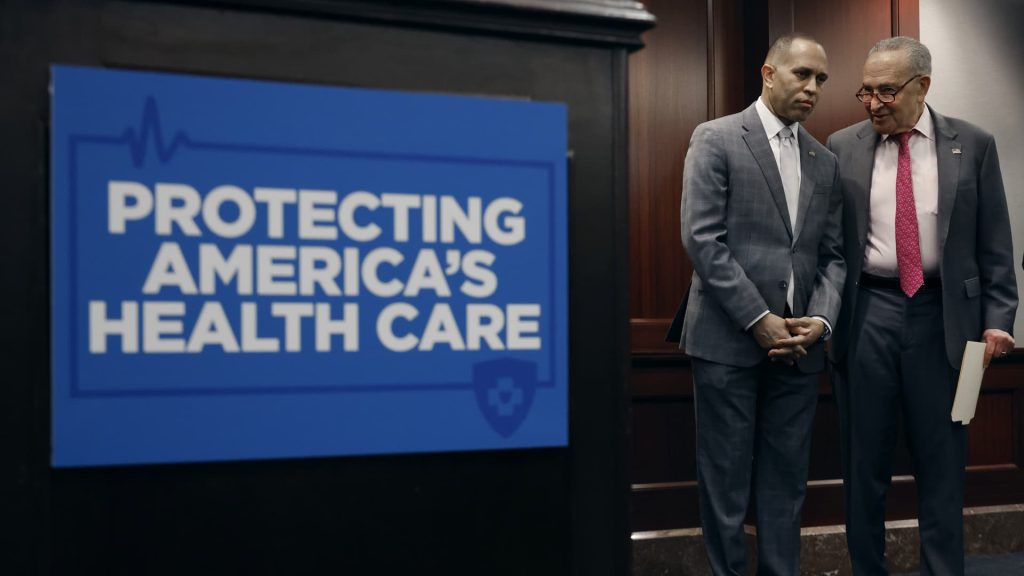House Minority Leader Hakeem Jeffries, D-N.Y., at left, and Senate Majority Leader Charles Schumer, D-N.Y., talk while attending an event to mark the 14th anniversary of the passage of the Affordable Care Act, at the U.S. Capitol in Washington, March 21, 2024.
Chip Somodevilla | Getty Images
The multitrillion-dollar tax and spending package House Republicans passed Thursday contains a multitude of changes that may affect consumers’ finances.
But the “One Big Beautiful Bill Act” is missing something health care advocates hoped to see: an extension of the insurance premium tax credits under the enhanced Affordable Care Act that are set to expire at the end of the year. The credits’ absence is notable as the bill includes other proposed changes to the ACA marketplace, experts say.
The ACA’s enhanced premium credits help make health insurance policies through the marketplace more affordable. Eligible applicants can use the credit to lower insurance premium costs upfront or claim the tax break when filing their return.
Instead of a lower-income person paying 2% of their income on their premium, they pay nothing, according to KFF, a health policy research nonprofit. Higher income people, who were originally ineligible for credits, currently pay no more than 8.5% of their income on their premium.
More from Personal Finance:
House Republican budget bill boosts maximum child tax credit to $2,500
What the House GOP budget bill means for your money
Judge orders Trump administration to reinstate Education Department employees
Without the extension, nearly all subsidized ACA enrollees can expect their monthly premiums to rise, said Cynthia Cox, vice president and director of the program on the ACA at KFF.
For example, a family of four making $85,000 would have to pay an additional $313 in premiums for coverage in 2026 and face a $900 increase in their out-of-pocket maximum, according to an April report by the Center on Budget and Policy Priorities.
“Pretty much everyone, almost everybody who’s buying their own health insurance, now would see their costs go up,” Cox said.
Here’s what to know if you buy health insurance through the federal marketplace.
Tax credits boosted ACA marketplace enrollment
The extended subsidies were passed via the American Rescue Plan Act during the pandemic, and covered plans in 2021 and 2022. The Inflation Reduction Act extended the benefit until the end of 2025.
The premium tax credits made health insurance purchased through the marketplace much more attractive and affordable for people, Cox said.
Since the extended tax credits have been in place, the enrollment in the ACA marketplace grew from 12 million in 2021 to a record 24.2 million in 2025, according to a February report by the Commonwealth Fund.
But if the benefits expire, “we’re basically back to the same Affordable Care Act that existed the last time Trump was president,” Cox said.
Some consumers may lose eligibility
If premium tax credits aren’t extended, some people may see their costs rise high enough that they can’t afford coverage. Under the original version of the ACA, middle-income households were often priced out of the health-care subsidies.
If we go back to earlier thresholds, those who earn more than four times the federal poverty level — $62,000 for an individual or $128,600 for a family of four with 2026 coverage — would lose eligibility for subsidies and would have to pay the full cost for their health plans, according to KFF.
Researchers at KFF anticipate that between the potential lapse of the credits coupled with the proposals, enrollment could shrink by one-third, leaving about 8 million uninsured in the U.S.
One change in the House GOP tax bill would increase by 4.5% the share of people’s income that they pay for premiums after tax credits in 2026, according to Gideon Lukens, senior fellow at the CBPP. It would also increase the maximum out-of-pocket limit by 4.5% in 2026, he said.
‘An issue of contention’
The premium tax benefits have been “an issue of contention” among lawmakers, as Republicans have not indicated an interest in extending the enhanced premium credits any further, said Jonathan Burks, executive vice president of economic and health policy at the Bipartisan Policy Center.
Yet, at least two GOP senators have said they are interested in extending the credits, KFF’s Cox said.
Sen. Lisa Murkowski, R-Alaska, has said she supports extending the enhanced subsidies to help people afford premiums. “I think we’re going to need to continue these premium tax credits,” she said in an interview with the Alaska Beacon in January.
Sen. Thom Tillis, R-N.C., expressed interest in extending the premiums in an interview with AxiosPro in March.
Neither Murkowski nor Tillis responded to CNBC’s requests for comment.
It’s possible that the ACA premium tax credits could be addressed in a different piece of legislation later in the year, Cox said.
“But at least right now, that’s not in this bill that’s being debated right now,” she said.

